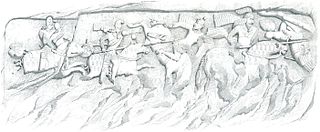The 200s decade ran from January 1, 200, to December 31, 209.
The 150s decade ran from January 1, 150, to December 31, 159.
The 190s decade ran from January 1, 190, to December 31, 199.
Year 195 (CXCV) was a common year starting on Wednesday of the Julian calendar. At the time, it was known in Rome as the Year of the Consulship of Scrapula and Clemens. The denomination 195 for this year has been used since the early medieval period, when the Anno Domini calendar era became the prevalent method in Europe for naming years.
The 210s decade ran from January 1, 210, to December 31, 219.
The 220s decade ran from January 1, 220, to December 31, 229.
The 230s decade ran from January 1, 230, to December 31, 239.

Year 200 (CC) was a leap year starting on Tuesday of the Julian calendar. At the time, it was known as the Year of the Consulship of Severus and Victorinus. The denomination 200 for this year has been used since the early medieval period, when the Anno Domini calendar era became the prevalent method in Europe for naming years.
Year 192 (CXCII) was a leap year starting on Saturday of the Julian calendar. At the time, it was known as the Year of the Consulship of Aelius and Pertinax. The denomination 192 for this year has been used since the early medieval period, when the Anno Domini calendar era became the prevalent method for Europeans for naming years.
Year 198 (CXCVIII) was a common year starting on Sunday of the Julian calendar. At the time, it was known as the Year of the Consulship of Sergius and Gallus. The denomination 198 for this year has been used since the early medieval period, when the Anno Domini calendar era became the prevalent method in Europe for naming years.
Year 231 (CCXXXI) was a common year starting on Saturday of the Julian calendar. At the time, it was known in Rome as the Year of the Consulship of Claudius and Sallustus. The denomination 231 for this year has been used since the early medieval period, when the Anno Domini calendar era became the prevalent method in Europe for naming years.
Year 205 (CCV) was a common year starting on Tuesday of the Julian calendar. At the time, it was known as the Year of the Consulship of Aurelius and Geta. The denomination 205 for this year has been used since the early medieval period, when the Anno Domini calendar era became the prevalent method in Europe for naming years.
Year 207 (CCVII) was a common year starting on Thursday of the Julian calendar. At the time, it was known in Rome as the Year of the Consulship of Maximus and Severus. The denomination 207 for this year has been used since the early medieval period, when the Anno Domini calendar era became the prevalent method in Europe for naming years.
Year 218 (CCXVIII) was a common year starting on Thursday of the Julian calendar. At the time, it was known as the Year of the Consulship of Severus and Adventus. The denomination 218 for this year has been used since the early medieval period, when the Anno Domini calendar era became the prevalent method in Europe for naming years.

Year 219 (CCXIX) was a common year starting on Friday of the Julian calendar. At the time, it was known in Rome as the Year of the Consulship of Antonius and Sacerdos. The denomination 219 for this year has been used since the early medieval period, when the Anno Domini calendar era became the prevalent method in Europe for naming years.

Year 221 (CCXXI) was a common year starting on Monday of the Julian calendar. At the time, it was known as the Year of the Consulship of Gratus and Vitellius. The denomination 221 for this year has been used since the early medieval period, when the Anno Domini calendar era became the prevalent method in Europe for naming years.

Year 224 (CCXXIV) was a leap year starting on Thursday of the Julian calendar. At the time, it was known as the Year of the Consulship of Iulianus and Crispinus. The denomination 224 for this year has been used since the early medieval period, when the Anno Domini calendar era became the prevalent method in Europe for naming years.
Zhang Ji, courtesy name Derong, was an official who lived during the late Eastern Han dynasty and early Three Kingdoms period of China. During the Battle of Tong Pass, Zhang Ji, Xiahou Yuan and others defended the city of Chang'an from attacks by the warlord Ma Chao and his allies. From 213 to 220, Zhang Ji served as the Inspector of Yong Province. In 220, after the Han dynasty ended and the Three Kingdoms period started, Zhang Ji served under the state of Cao Wei as the Inspector of Liang Province. In 221, he quelled a Lushuihu rebellion in the Hexi Corridor.
Events in the year 1946 in the Republic of China. This year is numbered Minguo 35 according to the official Republic of China calendar.



